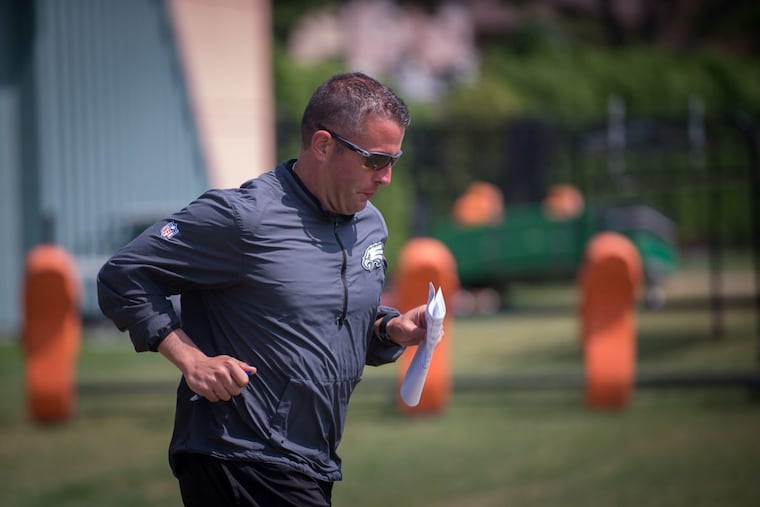Why interception percentage is the quarterback metric most important to Eagles QB coach John DeFilippo
Carson Wentz's interception percentage was 2.3 percent last season. John DeFilippo wants it lower than 2 percent.

Carson Wentz set every rookie passing record for the Eagles last season. If he continues to improve in Year 2, he could threaten many of the Eagles' single-season passing records.
But the one statistic that quarterbacks coach John DeFilippo cares the most about is not found on any fantasy football projections.
"Interception percentage," DeFilippo said. "Turnovers are the No. 1 factor of winning and losing. That's kind of who you are, in your DNA, if you turn the ball over. The two biggest things that follow guys from high school to college and college to the pros are completion percentage and interception percentage. That's a pretty telling statistic. I've done a lot of research on that through the years. It's kind of who you are. If you're a high-interception guy in college, you're going to be that in the pros. And likewise in completion percentage."
Wentz's interception percentage last season was 2.3 percent (14 interceptions in 607 attempts). That's a bit worse than the standard that DeFilippo sets, 2.0 percent or better.
The top five quarterbacks last season in interception percentage were New England's Tom Brady (0.5), Minnesota's Sam Bradford (0.9), Dallas' Dak Prescott (0.9), Oakland's Derek Carr (1.1), and Green Bay's Aaron Rodgers (1.1). Four of those QBs led their teams to the postseason.
Among quarterbacks who started at least eight games last season, 14 had interception percentages that fit within DeFilippo's standard. Eight of the 12 starting quarterbacks for playoff teams were in that group.
The one caveat is that DeFilippo doesn't use the regular interception number to grade his quarterbacks. He goes through every interception and determines if it was the fault of the quarterback, or if something else led to it, such as a tipped pass or a wrong route.
Some quarterbacks take more risks than others – Bradford plays more conservatively than Brett Favre did, after all. DeFilippo doesn't take playing style into consideration when forming his metric.
"A turnover's a turnover at the end of the day," DeFilippo said. "We try to limit those as much as you can. You're going to have a few when your arm gets hurt or the ball gets batted. Those are the ones that's going to happen. But you try to limit the forced interceptions."